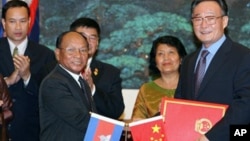PHNOM PENH —
Cambodia has seen huge growth of foreign aid and loans over the past two decades, but experts are beginning to question its worth—and what conditions might be attached.
Total aid from 1993 to 2012 amounts to around $10 billion, with the percentage of aid coming as loans steadily increasing. And a larger portion of that money is now coming from China, in a shift from the typical international aid patterns.
Chou Heng, a senior policy expert for the government’s Council for the Development of Cambodia, said the increase in aid has contributed to Cambodia’s development and poverty reduction, but many of the relevant ministries are not given the right to manage the money. That’s different with Chinese aid, he said. In those, the government has the right to manage the money, he said.
Cambodia received a total aid package of $550 million in 2004, according to government figures. By 2012, that number increased to $1.38 billion, an increase of about 14 percent per year.
China has been behind much of that increase, but other aid comes from international donors like Australia, Japan and the US, as well as the Asian Development Bank and the UN.
But donor priorities have shifted over the years. The health sector, for example, which was traditionally the most funded, has been surpassed by projects for infrastructure in recent years. Again, Chinese money accounts for the shift. Infrastructure aid has increased from $185 million in 2010 to $376 million in 2012.
Meanwhile, education has seen an increase in aid from $100 million in 2008 to $125 million 2012. Agriculture aid during the same period increased from $46 million to $130 million. Increases have also come in urban planning, information, culture and tourism.
Soeung Saroeun, executive director at Cooperation Committee for Cambodia, said aid has been useful for the country’s development, but no aid comes without conditions, he said. “It’s just that some conditions are written down, and some are not.”
Civil society organizations want to see aid packages that are transparent, documented and made public, he said, “to allow people to have a sense of ownership of aid management.”
Yim Sovann, spokesman for the opposition Cambodia National Rescue Party, said Chinese loans have higher interest rates compared to other donors, and the deals aren’t transparent.
“Some aid is useful, but some is not,” he said. Substandard road construction, subject to corruption and non-transparent bidding, for example, is not good for the country, he said. “Only one or two years after construction, the road is damaged again,” he said.
There are also those who argue that Cambodia is taking in too much aid.
Ear Sophal, a Cambodian-American scholar and author of “Aid Dependence in Cambodia,” told VOA Khmer that Cambodia should seek to minimize its dependence on foreign aid, which can cause imbalances in a government’s expenditures and revenue and engenders corruption.
A lot of aid money can mean a lot of loans, and those will have to be repaid by future generations, he said. Cambodia would do better to improve its tax collection, to reduce corruption and to increase foreign trade, he said.
But Chou Heng said the country can’t stop taking aid. Even as Cambodia develops, it will need foreign aid and the technical assistance that comes with it, he said.
Total aid from 1993 to 2012 amounts to around $10 billion, with the percentage of aid coming as loans steadily increasing. And a larger portion of that money is now coming from China, in a shift from the typical international aid patterns.
Chou Heng, a senior policy expert for the government’s Council for the Development of Cambodia, said the increase in aid has contributed to Cambodia’s development and poverty reduction, but many of the relevant ministries are not given the right to manage the money. That’s different with Chinese aid, he said. In those, the government has the right to manage the money, he said.
Cambodia received a total aid package of $550 million in 2004, according to government figures. By 2012, that number increased to $1.38 billion, an increase of about 14 percent per year.
China has been behind much of that increase, but other aid comes from international donors like Australia, Japan and the US, as well as the Asian Development Bank and the UN.
But donor priorities have shifted over the years. The health sector, for example, which was traditionally the most funded, has been surpassed by projects for infrastructure in recent years. Again, Chinese money accounts for the shift. Infrastructure aid has increased from $185 million in 2010 to $376 million in 2012.
Meanwhile, education has seen an increase in aid from $100 million in 2008 to $125 million 2012. Agriculture aid during the same period increased from $46 million to $130 million. Increases have also come in urban planning, information, culture and tourism.
Soeung Saroeun, executive director at Cooperation Committee for Cambodia, said aid has been useful for the country’s development, but no aid comes without conditions, he said. “It’s just that some conditions are written down, and some are not.”
Civil society organizations want to see aid packages that are transparent, documented and made public, he said, “to allow people to have a sense of ownership of aid management.”
Yim Sovann, spokesman for the opposition Cambodia National Rescue Party, said Chinese loans have higher interest rates compared to other donors, and the deals aren’t transparent.
“Some aid is useful, but some is not,” he said. Substandard road construction, subject to corruption and non-transparent bidding, for example, is not good for the country, he said. “Only one or two years after construction, the road is damaged again,” he said.
There are also those who argue that Cambodia is taking in too much aid.
Ear Sophal, a Cambodian-American scholar and author of “Aid Dependence in Cambodia,” told VOA Khmer that Cambodia should seek to minimize its dependence on foreign aid, which can cause imbalances in a government’s expenditures and revenue and engenders corruption.
A lot of aid money can mean a lot of loans, and those will have to be repaid by future generations, he said. Cambodia would do better to improve its tax collection, to reduce corruption and to increase foreign trade, he said.
But Chou Heng said the country can’t stop taking aid. Even as Cambodia develops, it will need foreign aid and the technical assistance that comes with it, he said.









